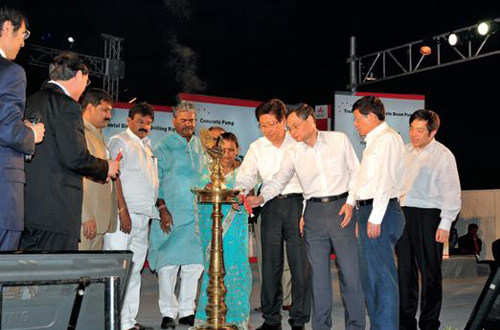|
 |
|
INAUGURATION: Chinese and Indian officials attend the inauguration ceremony of a plant of the Chinese construction machinery manufacturer Sany Heavy Industries in Maharashtra, India on April 12, 2010 (COURTESY OF THE CHINESE EMBASSY IN INDIA) |
Zhao Quanzhen is leaving India, and with it a career that he now questions. After working in the country for more than seven years, Manager of Air China's India Office, worries about the profit outlook of his past station despite more and more new routes being added between China and India.
Since Zhao was sent to Mumbai for the opening of a new flight route linking China and India in 2004, the number of routes operated by Air China between the two countries has quickly increased. There are now more than 20 flights a week.
"Almost all Indian states want us to establish direct flight routes from Chinese cities to Indian cities," Zhao said.
Despite big market potential as China and India rise simultaneously, the former manager remains cautiously pessimistic.
"It's very hard to make profits when operation costs are skyrocketing due to rising oil prices and the various taxes imposed," said Zhao.
More importantly, he added, the number of Chinese passengers going to India is limited. His sentiment is supported by data on the airline's passenger demographics. Of all passengers on the China-India route, less than 30 percent are Chinese nationals.
Travel woes
Statistics from the Chinese Embassy in New Delhi show 600,000 to 700,000 Indians travel to China annually while only 60,000 to 70,000 Chinese make trips to India.
"Besides Chinese people's preference to visit different tourist destinations in outbound travel, a major reason why there are fewer Chinese people going to India is India's tough restrictions on visas for the personnel of Chinese companies entering India," said Lou Chunhao, a researcher on South Asian studies with the China Institutes of Contemporary International Relations.
Despite a $27-billion trade deficit in China's favor last year, Indian companies in China far outnumber Chinese companies in India due to the tough restrictions.
Chinese businessmen complain about the application procedures to get a visa to India, with some having to supply an exorbitant number of documents while others are made to wait a long time.
Zhao has had his own wearisome experiences with visa problems. "It is very hard to get work visas. During my first few years in India, I was holding a business visa, so I had to leave the country every three to six months to renew it," Zhao said. And early this year, Zhao's finance director had to wait two months to renew his visa before returning to his office in New Delhi, disrupting business and causing annoyance for the staff.
"The office almost ceased to function during that period when I could not find a suitable substitute," Zhao said.
Lou said the visa problem is partly the outcome of inadequate political trust of India toward China, as well as India's employment protection policies.
"Bilateral relations have made much closer and closer in the last two decades, but still India is wary of China for historical reasons," said Lou.
Information from the Indian Ministry of Home Affairs reveals that China, along with Pakistan, Bangladesh, Sri Lanka, Bhutan, Afghanistan and Nepal, is on a list of specified countries that the Indian Government imposes tougher visa application standards on.
Lou said academics meet the same problems.
"Sometimes, our Indian counterparts prefer to hold international academic conferences in a neutral country in case the attendees cannot get Indian visas," said Lou.
| 